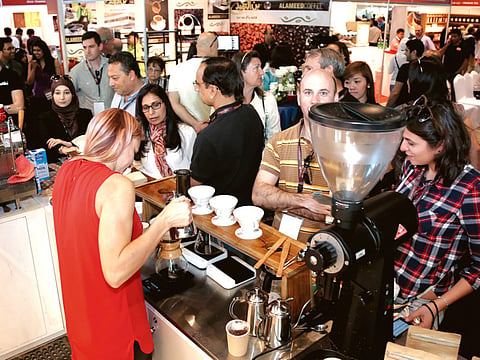UAE’s tea and coffee trade to rise 30 per cent
Market trends brew excellent results for nation’s tea and coffe sector

The expected growth will be driven by the country’s continuously flourishing tourism industry and the increasing number of coffee shops opening to address this demand, says Anselm Godinho, Managing Director, International Conferences & Exhibitions that organises the International Coffee and Tea Festival (ICTF), which takes place at the Meydan Gallery from November 11-13. This year’s event will present all facets of coffee, tea and café products, equipment and services and is positioned as a business networking opportunity for international producers and manufacturers to break into the regional market and secure a part of the hot beverages industry. “The country’s traditional coffee culture and an expanding tea market complement increasing investment in the café, coffee and tea businesses estimated to be worth between $350 million and $400 million,” adds Godinho. As of the end of last year, the UAE was home to more than 4,000 coffee shops and tea houses.
Specifically, demand for tea is growing due to the demographic make-up of the UAE. “The South Asian population, especially Indians as well as Arabs have a culture of tea consumption in its various blends and flavours in a relaxed environment along with snacks and food,” George says. “Cha Cha Chai, a subsidiary of Danube, for example, is capitalising on tea/chai being an inherent part of socialising by opening branded outlets with snacks and other food typically consumed with tea.” As another example of the growing demand for tea both in the Emirates and across the region, he cites the fact that the Lipton Jebel Ali factory has increased its production capacity to such an extent that it has become the largest tea factory within Unilever.
According to ICTF, more than 19,000kg of tea is consumed across the UAE each day, and the country is the world’s largest re-exporter of tea. Consumption of coffee, on the other hand, is rising with new outlets opening across the country, much of it in parallel with retail development. The UAE has issued more than 2,200 café licences over the past two years, with more than 90 in-shop and large-scale roasters planning to open their businesses in the next two years.
George says two trends are driving the coffee business — small batch or home roasters, and personalisation. “There is also a clear trend towards a specialised business model such as home-grown or in-shop roasters as opposed to a franchised model. This has largely to do with consumer demand with more people aware and expecting different flavours as they know the difference between the conventional coffee at chained outlets to a freshly roasted coffee, brewed in the right way.”
He adds that the growth will be accompanied by social awareness and a desire for education on speciality coffee. As the preference grows so will its consumption, competition and quality.
“There is a definitive trend towards a more personalised coffee experience where customers want to recreate the on-trade experience in the comfort of their living rooms with family and friends. As a result, the sales of fresh ground coffee pod and machines are growing albeit from a low base. Instant coffee in single 3-1 sachets is also growing with many flavours and variants entering the market for home consumption.”
International players dominate both sectors. Unilever Gulf retains the lead in the tea market with its Lipton and Brooke Bond brands, followed by Alokozay. The coffee segment, meanwhile, is dominated by Nestlé and Tchibo, although with the strong presence of Arab expatriates in the country, the Lebanese companies Société Ets Michel Najjar and Maison du Café Maatouk are also popular, accounting for a little more than 40 per cent of standard fresh ground coffee value sales in 2015, George says. “Coffee Planet is also interesting and we are tracking their shares separately before we break them out within our reports.”
The family business, which began roasting its own beans in 2008, recently announced the opening of the country’s largest roasting plant in Jebel Ali at an investment of Dh10 million. The company seems to be a perfect example of just how the UAE’s tastes have changed.
MORE THAN A TRADE FAIR
The International Coffee & Tea Festival (ICTF) is the only dedicated trade event for the hot beverages industry in the region. Organised by International Conferences & Exhibitions, the event takes place at Meydan Gallery from November
11-13. More than just a trade fair, here are some of the reasons to attend.
Coffee Championships: The ICTF is also home to the annual UAE Barista Championship, in its seventh edition this year. The event sees professional baristas vie for the title of the UAE’s Top Barista. It began yesterday and concludes with the final round and Champion’s Ceremony on Friday. The winner will represent the UAE in the 2016 World Barista Championship in Dublin, competing against 54 participants from every corner of the world.
Training programmes: In line with consumers’ rising demand for fresher, tastier and better-quality coffee, the ICTF is organising a series of training workshops and courses to help improve skills of baristas. The programmes are certified by the world’s largest trade association for speciality coffee – the Specialty Coffee Association of America.
Seminars: Key issues within the café industry will be addressed in a series of presentations for owners, operators and entrepreneurs. The first-time series, called Coffee & Tea in Business, is intended to help start-up and existing businesses.
— M.S.



